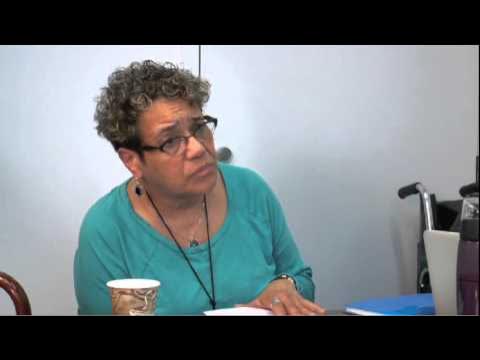Rebuilding Lives Through Teamwork - A stroke Patients Experience of CSSD
Summary
TLDRThe video features Su Potter, the Matron for Stroke Services at Chester Royal Hospital, discussing the comprehensive stroke care provided by her team. They meet patients at admission, conduct early swallowing assessments, and involve various therapists for treatment. A new early supported discharge service will allow therapy teams to support patients at home post-discharge. Bob, a patient, shares his experience, highlighting the team's support and his progress in relearning daily activities with their help.
Takeaways
- 🏥 The Specialist Stroke Matron, Su Potter, oversees stroke services at Chester Royal Hospital, highlighting the integration of acute and rehab care since April 2011.
- 👩⚕️ The stroke team attends the Accident and Emergency (A&E) department to meet patients upon arrival, providing early assessments and family involvement.
- 🗣️ Swallowing assessments are conducted promptly to ensure patient safety in terms of nutrition and hydration.
- 👨⚕️ A multidisciplinary team including physiotherapists, occupational therapists, and speech and language therapists is involved in the patient's care from the outset.
- 🏠 An early supported discharge service is being introduced to assist patients transitioning from hospital to home, enhancing continuity of care.
- 👨🍳 Bob, a patient, recounts his experience of having a stroke and the challenges he faced, including mobility loss and the need to relearn basic tasks.
- 💊 The hospital's pharmacy services play a role in managing medication and conducting blood tests for stroke patients.
- 🧍♂️ Bob's rehabilitation involved learning to walk again with assistance, using a quad stick, and practicing transfers to improve mobility.
- 🍲 Occupational therapy included relearning daily activities such as cooking and making a cup of tea, which Bob found challenging but progress-enhancing.
- 👨⚕️ Bob praises the hospital's team for their support, professionalism, and the positive impact they've had on his recovery.
- 📈 Bob's experience illustrates the importance of a comprehensive rehabilitation program that includes both physical and occupational therapy.
Q & A
Who is Su Potter and what is her role at Chester Royal Hospital?
-Su Potter is the Matron for stroke services at Chester Royal Hospital on the Eastwood Ward stroke unit. She has worked there for several years, including more recently with the new units that were combined in April 2011.
What is the benefit of the stroke team meeting patients at the point of admission?
-Meeting patients at the point of admission allows the stroke team to hear firsthand about how patients have been managing at home, meet relatives early on, and start planning the care they will receive, which is seen as beneficial for providing a seamless service.
Why is the swallowing assessment crucial for stroke patients?
-Swallowing assessments are crucial because they determine whether patients can swallow safely at an early stage, which is vital for their care and recovery.
What happens within the first 24 hours after a stroke patient is admitted?
-Within 24 hours of admission, stroke patients are seen by physiotherapists, occupational therapists, and speech and language therapists if needed. They may also involve a dietician and the nursing team.
How does the stroke team at Chester Royal Hospital define a successful stroke team?
-A successful stroke team at Chester Royal Hospital is defined by people working very closely together, with the strength of the team being dependent on these close working relationships.
What is the duration of rehabilitation for stroke patients at Chester Royal Hospital?
-The duration of rehabilitation varies; some patients require a short period of time and minimal therapy input, while others may need prolonged rehabilitation that can extend into weeks or even months.
What is the new early supported discharge service starting in October?
-The new early supported discharge service starting in October will involve therapy teams and nursing going out to patients' homes to support them post-discharge, aiming to enhance the care provided and make the transition home less daunting for patients.
What was Bob's experience when he first realized he had a stroke?
-Bob's experience was frightening as he lost mobility, couldn't move, and had to crawl to reach a phone to call for help. He was conscious but unable to stand, and his limbs felt like jelly.
What kind of therapies did Bob undergo during his rehabilitation?
-Bob underwent various therapies including physiotherapy, occupational therapy, and speech and language therapy if needed. He also had to relearn basic tasks like sitting, standing, and transferring from a wheelchair.
How did Bob find the support from the physiotherapy team at Chester Royal Hospital?
-Bob found the support from the physiotherapy team to be excellent, noting that they helped him progress significantly and made a positive difference in his rehabilitation.
What simple tasks did Bob manage to do during his rehabilitation that he considers significant?
-Bob managed to make cheese on toast and boil a kettle to make a cup of tea, which he considers significant progress as these are tasks he used to do easily before his stroke.
Outlines

This section is available to paid users only. Please upgrade to access this part.
Upgrade NowMindmap

This section is available to paid users only. Please upgrade to access this part.
Upgrade NowKeywords

This section is available to paid users only. Please upgrade to access this part.
Upgrade NowHighlights

This section is available to paid users only. Please upgrade to access this part.
Upgrade NowTranscripts

This section is available to paid users only. Please upgrade to access this part.
Upgrade NowBrowse More Related Video

M4. Interprofessional Communication: Scene 4A

A day in the life of a hospital social worker

Recognising Risk and Improving Patient Safety - Mildred's Story

Smartphone Technology and Telemedicine - Mayo Clinic

KUNJUNGI RUMAH SAK1T WELAS ASIH | INI LOGO DAN RENCANA PENGEMBANGAN

Komunikasi Efektif kelompok B3
5.0 / 5 (0 votes)